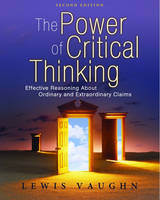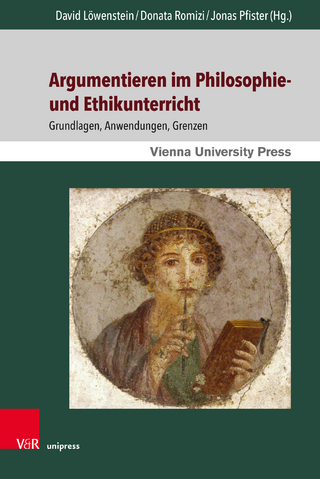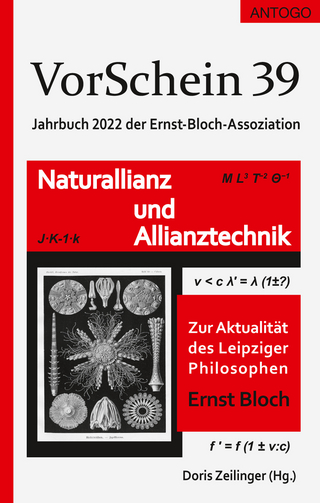
The Power of Critical Thinking
Oxford University Press Inc (Verlag)
978-0-19-532041-1 (ISBN)
- Titel ist leider vergriffen;
keine Neuauflage - Artikel merken
The Power of Critical Thinking, Second Edition, integrates many pedagogical features including hundreds of diverse exercises, examples, and illustrations; progressive, stand-alone writing modules; numerous text boxes; step-by-step guidelines for evaluating claims, arguments, and explanations; a glossary of important terms; and many reminders, summaries, and review notes throughout. The text is supplemented by a companion website at www.oup.com/us/criticalthinking (offering a student study guide and more), and an Instructor's Manual with Test Questions (available both in print and on a CD). This unique text features a modular structure that allows instructors to teach the chapters in almost any order. Written in a student-friendly style and enhanced by humor where appropriate, it is ideal for courses in critical thinking, introduction to logic, informal logic, argumentative writing, and introduction to argumentation.
New to the Second Edition * Full-color throughout and an expanded art program (37 more photos and illustrations) * A new writing module--an annotated sample student paper--and five additional essays for analysis * A new section on evaluating news reports and advertising * Timely discussions of intelligent design and population (nonintervention) studies * Expanded coverage of experts and authors and reasons to doubt their reliability * More "Field Problems" and exercise questions * Chapter objectives and key terms with definitions for each chapter
Lewis Vaughn is the author or coauthor of several books, including: Bioethics: Principles, Issues, and Cases (OUP, 2008); How to Think About Weird Things: Critical Thinking for a New Age, Fifth Edition (2007); Doing Ethics: Moral Reasoning and Contemporary Issues (2007); Doing Philosophy: An Introduction Through Thought Experiments, Third Edition (2006); and Writing Philosophy: A Student's Guide to Writing Philosophy Essays (OUP, 2005).
Preface; 1. BASICS; 1. THE POWER OF CRITICAL THINKING; Why It Matters; How It Works; Summary; Exercises; Field Problems; Self-Assessment Quiz; CRITICAL THINKING AND WRITING: MODULE 1; Writing Assignments; 2. THE "ENVIRONMENT" OF CRITICAL THINKING; Perils of a Haunted Mind; Perils of a Haunted Worldview; Summary; Exercises; Field Problems; Self-Assessment Quiz; Integrative Exercises; CRITICAL THINKING AND WRITING: MODULE 2; Writing Assignments; 3. MAKING SENSE OF ARGUMENTS; Argument Basics; Judging Arguments; Finding Missing Parts; Argument Patterns; Diagramming Arguments; Assessing Long Arguments; Summary; Field Problems; Self-Assessment Quiz; Integrative Exercises; CRITICAL THINKING AND WRITING: MODULE 3; Writing Assignments; 2. REASONS; 4. REASONS FOR BELIEF AND DOUBT; When Claims Conflict; Experts and Evidence; Personal Experience; Fooling Ourselves; Claims in the News; Advertising and Persuasion; Summary; Exercises; Field Problems; Self-Assessment Quiz; Integrative Exercises; CRITICAL THINKING AND WRITING: MODULE 4; Writing Assignments; 5. FAULTY REASONING; Irrelevant Premises; Unacceptable Premises; Summary; Exercises; Field Problems; Self-Assessment Quiz; Integrative Exercises; CRITICAL THINKING AND WRITING: MODULE 5; Writing Assignments; 3. ARGUMENTS; 6. DEDUCTIVE REASONING: PROPOSITIONAL LOGIC; Connectives and Truth Values; Checking for Validity; Summary; Field Problems; Self-Assessment Quiz; Integrative Exercises; Writing Assignments; 7. DEDUCTIVE REASONING: CATEGORICAL LOGIC; Statements and Classes; Translations and Standard Form; Diagramming Categorical Statements; Sizing Up Categorical Syllogisms; Summary; Field Problems; Self-Assessment Quiz; Integrative Exercises; Writing Assignments; 8. INDUCTIVE REASONING; Enumerative Induction; Analogical Induction; Causal Arguments; Summary; Field Problems; Self-Assessment Quiz; Integrative Exercises; Writing Assignments; 4. EXPLANATIONS; 9. INFERENCE TO THE BEST EXPLANATION; Explanations and Inference; Theories and Consistency; Theories and Criteria; Telling Good Theories from Bad; Summary; Field Problems; Self-Assessment Quiz; Integrative Exercises; Writing Assignments; 10. JUDGING SCIENTIFIC THEORIES; Science and Not Science; The Scientific Method; Testing Scientific Theories; Judging Scientific Theories; Science and Weird Theories; Making Weird Mistakes; Judging Weird Theories; Summary; Field Problems; Self-Assessment Quiz; Integrative Exercises; Writing Assignments; 11. JUDGING MORAL ARGUMENTS AND THEORIES; Moral Arguments; Moral Theories; A Coherent Worldview; Summary; Exercises; Field Problems; Self-Assessment Quiz; Integrative Exercises; Writing Assignments; APPENDIX A: ESSAYS FOR EVALUATION; 1. "Death Penalty Discriminates Against Black Crime Victims"; 2. "Marine Parks"; 3. "The Wrong Ruling on Vouchers"; 4. "The Kalam Cosmological Argument"; 5. "More Innocents Die When We Don't Have Capital Punishment"; 6. "Misleading the Patient for Fun and Profit"; 7. "Tight Limits on Stem Cells Betray Research Potential"; 8. "The Cohabitation Epidemic"; 9. "The Demon-Haunted Sentence: A Skeptical Analysis of Reverse Speech"; 10. "Amityville: The Horror of It All"; 11. "A Deviance from God's Norm"; 12. "Marriage Still Evolving, as Ever"; 13. "Slouching Toward Chimeras"; 14. "The Right to Ridicule"; 15. "Time to Think"; APPENDIX B: ANSWERS TO EXERCISES; Notes; Glossary; Credits; Index
| Erscheint lt. Verlag | 2.2.2007 |
|---|---|
| Zusatzinfo | 99 illustrations |
| Verlagsort | New York |
| Sprache | englisch |
| Themenwelt | Geisteswissenschaften ► Philosophie ► Logik |
| ISBN-10 | 0-19-532041-7 / 0195320417 |
| ISBN-13 | 978-0-19-532041-1 / 9780195320411 |
| Zustand | Neuware |
| Haben Sie eine Frage zum Produkt? |
aus dem Bereich


